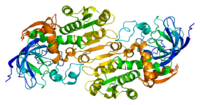
Photo from wikipedia
BackgroundFurfural and 5-hydroxymethylfurfural (HMF) are the two major furan aldehyde inhibitors generated from lignocellulose dilute acid pretreatment which significantly inhibit subsequent microbial cell growth and ethanol fermentation. Zymomonas mobilis is… Click to show full abstract
BackgroundFurfural and 5-hydroxymethylfurfural (HMF) are the two major furan aldehyde inhibitors generated from lignocellulose dilute acid pretreatment which significantly inhibit subsequent microbial cell growth and ethanol fermentation. Zymomonas mobilis is an important strain for cellulosic ethanol fermentation but can be severely inhibited by furfural and (or) HMF. Previous study showed that Z. mobilis contains its native oxidoreductases to catalyze the conversion of furfural and HMF, but the corresponding genes have not been identified.ResultsThis study identified a NADPH-dependent alcohol dehydrogenase gene ZMO1771 from Z. mobilis ZM4, which is responsible for the efficient reduction of furfural and HMF. Over-expression of ZMO1771 in Z. mobilis significantly increased the conversion rate to both furfural and HMF and resulted in an accelerated cell growth and improved ethanol productivity in corn stover hydrolysate. Further, the ethanol fermentation performance was enhanced again by co-expression of the transhydrogenase gene udhA with ZMO1771 by elevating the NADPH availability.ConclusionsA genetically modified Z. mobilis by co-expressing alcohol dehydrogenase gene ZMO1771 with transhydrogenase gene udhA showed enhanced conversion rate of furfural and HMF and accelerated ethanol fermentability from lignocellulosic hydrolysate. The results presented in this study provide an important method on constructing robust strains for efficient ethanol fermentation from lignocellulose feedstock.Graphical Abstract
Journal Title: Biotechnology for Biofuels
Year Published: 2017
Link to full text (if available)
Share on Social Media: Sign Up to like & get
recommendations!